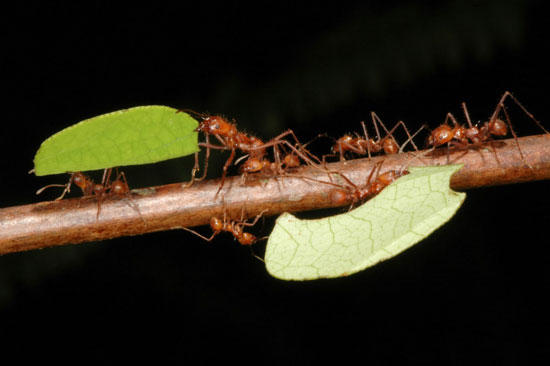Social behavior of leaf-cutting ants is related to genes
Through analysis and comparison of genome sequences of ants in general, scientists at the University of Copenhagen of Denmark and the Chinese University of Genome Research Institute in Shenzhen, China, have discovered that behavior The societies and symbiotic lifestyles of leaf-cut ants (scientific name Acromyrmex octospinosus) are closely related to some special genes.

Research results are available on Genome Research's website.
Agriculture has a very important meaning in the evolution of human culture, but humans are not the only creatures who choose this lifestyle. Leaf-cut ants also have the ability to perform agricultural production like humans.
They cut leaves, then use these leaves to grow mushrooms as food for the same species. Through testing and analyzing the sequence of the entire leaf-cutting ant genome, scientists have discovered two abnormal genes in their genome. Neuropeptides are important for many organisms.
The researchers, when comparing leaf-cutting ant genes with the neuropeptide encoded by genetically identified ants, found an amazing result.
Specifically, scientists discovered that in the leaf ants genome exist similar neuropeptide genes, most of the nervous system excretion of ants in general has very similar structure, most likely the This resemblance can be formed from the ancestors of ants.
According to Dr. Zhang Chang Tiep of the Chinese University of Genome Research Institute, scientists will continue to further study the genetic mechanism for social behavior of insects from a comparative perspective of genome overall. , thereby helping to understand the intrinsic genetic nature of human life.
- Strange things about the ant world
- Ants have known 'cultivation' since ... 60 million years ago
- Colonial colonial behavior changes after winning
- The leaf-cutting ant accelerates when it feels like it's going to rain
- Ants know how to produce antibiotics
- Why does a thousand ant colonies never suffer from
- Some similarities between ants and people we don't know yet
- Mushrooms turn ants into zombies to control ants, to kill ants around the nest
- Creates ants like monsters
- What phenomenon causes iPhone to
- Discover the key to the social status of ants
- Survival of parasitic fungus Ophiocordyceps unilateralis
 Why do potatoes have eyes?
Why do potatoes have eyes? 'Tragedy' the world's largest carnivorous life: Death becomes ... public toilet
'Tragedy' the world's largest carnivorous life: Death becomes ... public toilet Tomatoes were once considered 'poisonous' for 200 years
Tomatoes were once considered 'poisonous' for 200 years Detecting microscopic parasites on human face
Detecting microscopic parasites on human face